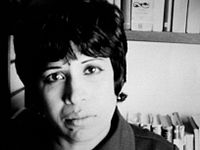Vimala Devi
| Vimala Devi | |
|---|---|
 |
|
| Born | 1932 Penha de França, Goa |
| Occupation | Short story writer, Poet, Translator |
Vimala Devi is the pseudonym of Teresa da Piedade de Baptista Almeida (born 1932), a Goan writer, poet and translator.
Vimala Devi was born in 1932 in the village of Britona in the parish of Penha de França, across the Mandovi river from Panjim, the principal town of Goa. At that time, large tracts of land in Britona were owned by Devi's family, which belonged to the elite Catholic Bamon or brahmin caste bhatkar landowners. The bhatkar class owned land and the labour of the mundkar class of lower-caste inhabitants in what was essentially a feudal relationship. Although this rural aristocracy was still predominant at this time, this was the period when the decline of the land-owning class first began to set in, a theme that appears in Devi's later fiction. After Goa's incorporation into India laws were passed giving the mundkar workers rights to the lands on which they had always lived and worked and abolishing their duty to provide unpaid labour to the bhatkar landowners.
As in many high caste families at the time, Portuguese was spoken at home alongside Konkani, the vernacular language of Goa. The author pursued primary studies in Portuguese and also in English, which even under the Portuguese administration was widely used by the Christian population of the territory.
Whilst in Goa, Vimala Devi contributed articles and poetry to two of the main Portuguese-language newspapers, the Diário da Noite and O Heraldo. Whilst the former is now defunct, the latter continues to appear in an English language edition.
Vimala Devi moved to Lisbon in 1957 to rejoin part of her family already established in the city and began work as a translator. The first stage of her career as a writer is marked by a concern with bringing the world of the then-Portuguese Estado da India into representation. It was also at this time that the writer chose her pseudonym, a name that reflected a desire to project her pre-conversion Hindu identity and her desire to reflect the hopes and aspirations of both the Hindu and Catholic communities of Goa (as in the short stories of Monção where both communities share space in the same collection). Thus, for the first time in Portugal, there appeared a writer of Hindu appellation writing in Portuguese about the country's recently lost colony. In this period she published a collection of poems entitled Súria in 1962 and a book of short stories called Monção, which was written and published in 1963.
...
Wikipedia
